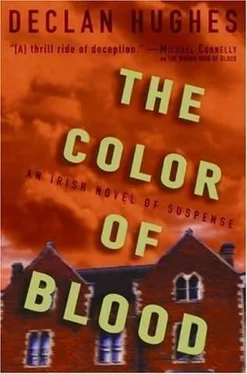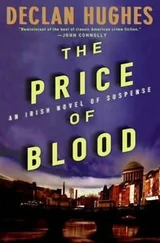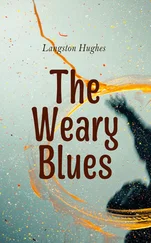“You two had never discussed her father’s death?”
“She never brought it up. Except to say, you know, thanks for doing your best. Anyway, he was admitted…it was a bank holiday.”
“You were a junior then?”
“That’s right. There was no consultant on duty.”
“Even in a private clinic?”
“Don’t get me started. Dr. O’Connor collapsed while playing rugby. Seven-a-side, I think. Myocardial infarction, was my assumption. He was sweating profusely, I remember he stank of booze, his heart was racing, his breathing was shallow, he was passing in and out of consciousness. There was difficulty getting hold of his wife. And the friend who admitted him made no mention of diabetes. He said it must have been a heart attack. Repeated it several times.”
“And…”
“And the symptoms seemed to back him up: we put him on an ECG, gave him nitro on an IV, oxygen, all the standard stuff, but he fell into a coma and died within a couple of hours. His wife, Sandra O’Connor as she was, she never showed up, it seems she was in the countryside, no signal on her phone.”
“And in your judgment, if you had known he had had an overdose of insulin…”
“If I had known he was a diabetic, I would have looked out for hypoglycemia, dextrose could have been administered at a gradual rate, and he might have survived. No guarantee he would have, he went pretty fast. But he didn’t have a bracelet, no one around knew him, we didn’t have his records.”
“So? The friend didn’t know he was diabetic. That’s common enough, surely, especially among men.”
“You don’t understand. The friend…the friend was Denis Finnegan.”
I felt as if space and time had fallen away in the brightly lit waiting room, as if I had known this lilting country-voiced doctor all my life, and had been waiting for him to say what he had just said.
“All right,” I said. “But he didn’t necessarily know Dr. O’Connor well, did he? I mean, what kind of rugby did they play together?”
“They coached Castlehill College. Rock had for years, Dr. Rock, he was famous. And Finnegan had started back in the eighties, when he taught at the school. I was a boarder there, so were all my brothers. Rugby may be a religion around here, but Castlehill Rugby…that’s Opus Dei, you might say. No offense if you’re-”
“None taken. And I’m not. But Denis Finnegan is a solicitor, not a teacher.”
“Aye, but he was what you might call a late vocation. He taught for about five years.”
“At Castlehill. In the eighties.”
The same time Sandra was there. They knew each other before. Before Audrey O’Connor, before Stephen Casey. They’d known each other all along.
“Absolutely. And Rock was coaching even though he was a full-time doctor, they’d bring past pupils back if they could give the team something extra. Finnegan was a useful little hooker, well, I guess he was little in his schooldays. Nearly made the grade, played with Shane Howard at Seafield back in the day. So basically he must have known, it wasn’t some guy you met up with for Saturday-morning sevens; they were lifelong friends.”
“You didn’t know. I mean, did your brothers know?”
“It’s not something you’d let the pupils in on. But a close colleague? Hard to believe he wouldn’t know.”
I was reaching for a thought, but it felt like I was opening a door into a blizzard: every time I looked out, the door slammed in my face, and the sound it made was Denis Finnegan . Finally, I made it.
“So did Finnegan coach into the nineties there?”
“Coaching up until a couple of years back, he worked on scrummaging, front-row maneuvers, rucks and mauls through the phases, with all sides, even the S.”
“Even the S. Even the senior cup team David Brady played on?”
“I’d say he’d’ve coached all the teams young Brady played on. God that’s right, David Brady.”
I had a flash of the e-mail address David Brady had sent Emily Howard’s sex film to: “maul@2ndphase.ie.” Rugby jargon. I was out in the blizzard now, and though the buffeting winds were chill, at least I had some idea where I was going.
“So what should we do?” said Morgan. “Should we call the Guards? I mean, this could be manslaughter at least, maybe even murder.”
Morgan’s pager went off.
“Let me hang on to it for a while,” I said. “Or not,” as I quickly saw a frown of suspicion in Morgan’s face. “I know, I’m working for the Howards, but believe me, I’m not above the law, and nor are they; the Guards wouldn’t tolerate me for five seconds if I tried to help my clients cheat justice. I just…I’m working the case, and now I feel it’s beginning to come together, and I don’t want to jump before I’m ready.”
Morgan looked at me through his clear farmboy’s eyes, as if I’d just asked him if I could operate on one of his patients.
“I’m going to ring the Guards.”
“Why not leave it till the morning? They probably won’t get to it before then anyway: nighttime Dublin, lot on their plates. Call them first thing. And remember, Finnegan may well say he didn’t know about O’Connor’s diabetes, and he may well be telling the truth, and even if he isn’t, there’s not a lot the Guards can do if he insists he is.”
Morgan considered this. And then his pager went off again, and he sprang to his feet.
“Fair enough. The morning. You’ll be ready to jump by then, will you?”
One way or another, I thought, one way or another.
But I wasn’t ready yet.
In the car park, Tommy said he’d remembered something else.
“When Brock Taylor worked for your oul’ fella?”
“Yeah?”
“I remember the bike, the Norton, and I knew it must have been him, because he had the badger streak in his hair. But back then, he didn’t go by Taylor.”
“No? What was he then?”
“It was one of the names you used. Dalton.”
“You sure? That’s very good, Tommy. Okay, I think it’s time you went home.”
“No, Ed, I’m happy to stay. To, you know, whatever. Make it up.”
“You’ve made it up. To me. Go home, get some sleep. It’s been a big night.”
Tommy grinned sheepishly, feeling his face.
“You can call a cab from inside.”
Tommy made to go, then stopped.
“I don’t have my key,” he said.
“I meant, home to your own house. You can’t stay in Quarry Fields. Not tonight, anyway.”
Tommy’s face flared with indignation and hurt, but he tamped it down, nodded, turned and walked into the Howard Clinic.
I sat in the car park and phoned Shane Howard at the house and surgery numbers and on his mobile; I went straight through to the machine each time, so I called Denis Finnegan. His office phone went straight to voice mail; he answered his mobile immediately.
“Denis Finnegan.”
“Ed Loy, Denis. I hope it’s not too late to call.”
“Never too late, my friend, I’ve been hoping you’d get in touch. And apologies for my vanishing act this afternoon; I’m afraid one of the hazards of my profession is that the allied guilds upon whom we must depend ply their trade in a volatile and unpredictable manner; hence my expeditious removal to advise a, a sole trader and, ah, commodities broker from Finglas on his rights and entitlements under the law, or indeed whether he had any remaining, given the quantity of refined coca leaf powder he was holding when arrested.”
I’m sure this stuff went down a bundle in Blackhall Place or in the Tilted Wig or whatever those pubs near the Four Courts are called; I was only glad I was getting it over the phone, so I didn’t have to applaud him for saying it.
“The information that David Brady and Jessica Howard were having an affair came in the form of a phone call to Shane.”
Читать дальше










